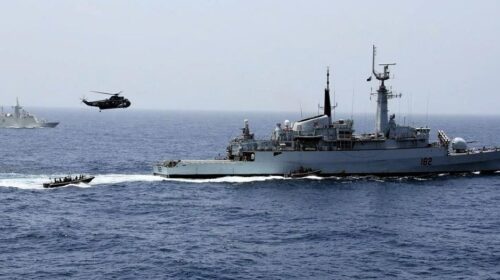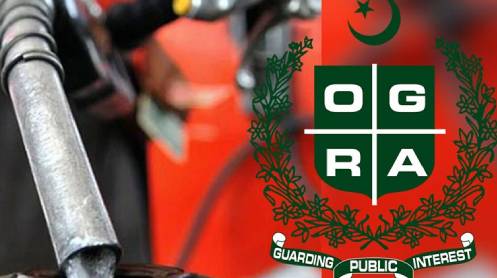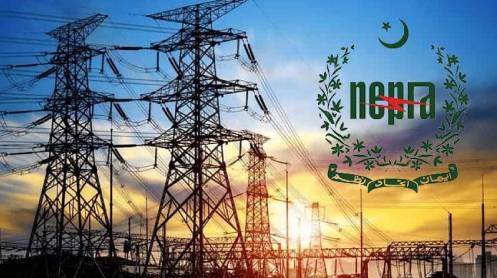The maritime sector is the bedrock of Pakistan’s economy as more than 90% of our trade is carried out by seas. Pakistan has huge maritime potential and its economic development is intrinsically linked to the development of maritime sector.
Lack of awareness about the maritime sector keeps us away from utilizing the blue benefits. Pakistan Navy, as a major stakeholder, is shaping the maritime mindset across the country to create the necessary awareness to harness the potential of our blue economy.
To this end, the Pakistan Navy under the auspices of the Ministry of Maritime Affairs (MoMA) is going to organise the Pakistan International Maritime Expo and Conference (PIMEC) alongside Pakistan Navy’s AMAN exercise next year.
There is no denying the fact that the future belongs to oceans. Maritime is not just a sector but a parallel economy, where all other sectors of the economy cross through it oceans, no doubt holds great significance in human history. In early ages, human connectivity across unattached landmass was only possible via oceans. In the era of globalisation, the importance of oceans has further increased.
The need for sustainable development amidst an ever-expanding global population and diminishing resources on land has engendered a worldwide shift from a green/brown economy to blue economy. The blue economy is an emerging concept. In a short period, it has accomplished great success.
The blue economy is an ocean-oriented sustainable use of ocean resources for economic growth — improving livelihood and creating job opportunities. It refers to leveraging the coastal and marine resources for economic benefits, emphasising sustainable economic growth and environmental conservation. United Nations 2030 Agenda for Sustainable Development directly linked sustainable economic growth and blue economy via SDG 14.
Pakistan has integrated SDGs into its domestic development agenda, which implies that Pakistan is cognizant of the blue potential. Pakistan is a lower-middle-income country, with an economy growing at less than a 3 percent growth rate.
Being the 5th most populous economy globally with a population growth rate of nearly 2 percent, Pakistan might face acute food security challenges in the future. The extreme vulnerability to climate change needs new forms of decision-making, such as investing more in the blue economy because Pakistan might face food security problems related to the limited land and water resources.
The blue economy of Pakistan offers a wide-range of maritime sectors peculiar to the geostrategic and economic realities of the country. It includes maritime industries namely, fisheries, coastal tourism, maritime transport, oil and gas, salt manufacturing, chemical, electric power, shipbuilding, marine engineering, aquaculture, marine biotechnology/biomedicine, scientific research, deep sea-bed mining, resource extraction, oceanic renewable energy and maritime tourism.
Oceans contribute nearly US$1.5 trillion annually to the world’s economy. The economists estimate that the estimated worldwide business worth of the blue economy is around $24 trillion per year. The world’s approximately 90% of trade takes place via oceans and 350 million jobs across the world are linked to fisheries. It is prognosticated that by 2025, the world’s 34% of crude oil production will come from oceans.
Pakistan has massive potential for blue economy due to its extended coastline, marine resources, harbours, sea trade and maritime professionals for the development of the maritime sector.
The maritime sector of Pakistan is considered the jugular vein of the economy because almost 95% of its trade and 100% of minerals and resources are imported through the sea route. Pakistan has an Exclusive Economic Zone (EEZ) and continental shelf of around 290,000 sq.km which is alone bigger than the land mass of Punjab and KPK.
Pakistan’s annual revenue from the blue economy is just $450 million. The actual potential of Pakistan’s blue economy is more than $100 billion. The exclusive geostrategic position of Pakistan lends its ports a unique significance concerning maritime trade.
The shipping industry of Pakistan is earning profit even more than 2,500 million Rupees, earlier it was even lesser than 1,500 Million Rupees. The same is the case with cargo lifting with an approximate capacity of 10,000 tonnes. Besides this, the shipping industry is growing, but it still needs proper management and attention so that it may work well.
The sea food industry of Pakistan provides food and other stuff essential for living. Pakistan’s seafood industry has a worth of more than $1 billion. In the products of the fish industry, the country holds 28th rank in the world.
Pakistan’s seafood industry contributes around 1% of GDP, and it can employ more than 10,000 people. Currently, the fish and seafood exports of Pakistan are limited to $450 million only, but it can contribute even further to the national GDP and can be enhanced to $2-2.5 billion if it has a proper deep-sea fishing policy.
Pakistan has immense Maritime tourism potential with a long coastline of 1000kms which is blessed with diversified natural, religious, and cultural tourism resources. This sector is vital for economic growth, employment generation, and food supply.
Tourism generates around 5% of the national GDP. There are more than 10 beach spots discovered in Pakistan that can attract tourists’ attention from around the world towards beautiful places in Pakistan having vast biodiversity and attractive beaches. If these spots are developed properly by the government, these can provide a revenue of more than $4 billion to the national kitty.
Pakistan’s maritime sector has huge growth potential but needs favourable policies and substantial investment to materialise the dream of sustainable growth into reality. “Despite being a bona fide maritime nation, Pakistan suffers from sea blindness”.
Since its inception, Pakistan has been unable to fully capitalise on its maritime potential. The geo-strategic location provides Pakistan with a pivotal position in the changing dynamics of the Indian Ocean and if this potential is utilised to its maximum, Pakistan can convert its vast sea zone into an epicenter of the blue economy in the region.
Pakistan, regardless of having a straight way into the sea, has not been able to use the sea and its resources to its full gain mainly due to a lack of maritime awareness. To optimally benefit from this natural endowment, the foremost thing to do is to create and increase awareness and knowledge among the decision-makers as well as the general public regarding Pakistan’s maritime potential.
Economic experts believe that if the blue resources are properly utilized then this sector can create more than one million jobs in Pakistan. The maritime segment of Pakistan is one of the key factors of its national economic and military power, as 95% of its trade is happening through the sea. It is high time for Pakistan to take inclusive and concrete steps to create maritime awareness in the nation.
Pakistan Navy has been doing utmost efforts to create public awareness and to highlight the importance of the blue economy for Pakistan. Being a major stakeholder in the political and strategic environment of the Indian Ocean Region, PN has maintained a firm stance to promote Pakistan’s maritime potential. Pakistan Navy is playing a vital role in the exploration of marine resources.
In addition, Pakistan is also blessed with 160,000 hectares of mangrove forests. Pakistan is ranked 24th rank worldwide according to the area of mangroves forests. The blue economic model in Pakistan is feasible as it is growing and developing after having much awareness of the importance and prospects of the maritime sector.
In this regard, the Pakistan Navy is organising an international Maritime Expo Conference to bring together stakeholders and diverse Maritime industries, academician, and policymakers to gather on one platform and disseminate as much knowledge as they can. At Maritime Conference, eminent speakers, experts, and reps from public and private sectors will share their views on the Maritime investment potential in Pakistan. This will help policymakers and stakeholders to reach a workable solution to achieve maximum benefits.
Therefore, the soft launch of the PIMEC event series is going to be hosted in Islamabad on 26 July and the major event of PIMEC will be conducted regularly from the next year in tandem with Pakistan Navy’s multi-lateral exercise series, AMAN.
This event will eventually help in providing opportunities to Maritime Industry to display products at one forum and interact directly with their international counterparts. Moreover, PIMEC will provide impetus to Pakistan’s maritime and defence industries for establishing joint ventures with the International Maritime and Defence manufacturers. This will also further highlight the country’s maritime potential and project country’s image as a maritime nation contributing towards peace and stability.





